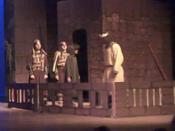Kristiane Plehwe 11F7
The passage extract from Shakespeare's Macbeth, illustrates the final battle scene between Macbeth and Macduff, whom Macbeth has tried to avoid ever since his ambition to kill King Duncan. The passage refers to the three worlds explored in the play, the natural, unnatural and the imaginative worlds, which all contributed to Macbeths' actions and ambition, which consequentially lead him to his fatal death. The strong imagery reveals the issues and concepts explored throughout the play, and the characters personalities are emphasized by the sentence structure and diction.
The passage begins with 'Alarums' followed by Macduff calling Macbeth a 'Tyrant' which immediately creates tension. The tension heightens throughout the passage by continuous enjambment, caesuras which create dramatic pauses and the choice of words emphasizing actions or characters. More chaos is suggested by the third alarum sounded when Macbeth enters. It is ironic that Macbeth states he isn't going to be the 'Roman fool and die on [his] own sword' as he brought his fate upon himself from the contribution of the unnatural world of the witches prophecies.
The symbolism of Macduff using the words 'hell-hound' instead of former 'brave Macbeth' to address him, implies that Macbeth has upturned the natural order and therefore being as low in the order as dogs and also banished to hell after death. Macbeth had insulted the murderers hired for Banquo matching them to dogs, not men, and with Macduff being straightforward with 'hell-hound' also implies Macbeth is not worthy enough to be a man. Macduff also portrays Macbeth as one of the 'rarer monsters' held in captivity for 'show', to be put up for humiliating. 'Hell-hound' is emphasized by the caesuras before and after and a repetition of turn. As Macduff only has one line with those words,


